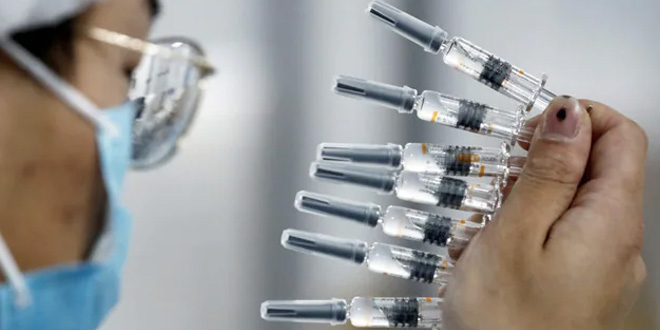Highlights
- The vaccine is produced by the Beijing-based pharmaceutical company Sinovac
- The world desperately needs multiple COVID-19 vaccines: WHO Official
- China has offered 10 million vaccine doses to COVAX facility
Beijing: The World Health Organisation (WHO) said on Tuesday (June 1) that it has approved China’s second COVID-19 vaccine ‘Sinovac’ for emergency use listing. “WHO today validated the Sinovac-CoronaVac COVID-19 vaccine for emergency use, giving countries, funders, procuring agencies and communities the assurance that it meets international standards for safety, efficacy and manufacturing,” the UN health agency said in a statement.
Also Read: Coronavirus Explained: All You Need To Know About The COVID-19 Vaccine For Children In India
The vaccine is produced by the Beijing-based pharmaceutical company Sinovac.
The world desperately needs multiple COVID-19 vaccines to address the huge access inequity across the globe. We urge manufacturers to participate in the COVAX Facility, share their knowhow and data and contribute to bringing the pandemic under control, said Dr Mariângela Simao, WHO Assistant-Director General for Access to Health Products.
On May 7, WHO granted conditional approval to China’s Sinopharm COVID-19 vaccine for emergency use, which helped Beijing to step up its vaccine diplomacy amid the virus surge.
China for its part has approved about five of its vaccines for emergency use and especially using Sinopharm and Sinovac vaccines for both at home and abroad. China has offered 10 million vaccine doses to COVAX facility which is a WHO backed initiative to provide vaccines to developing countries.
WHO’s Emergency Use Listing (EUL) is a prerequisite for COVAX Facility vaccine supply and international procurement. It also allows countries to expedite their own regulatory approval to import and administer COVID-19 vaccines.
WHO has already listed the Pfizer/BioNTech, Astrazeneca-SK Bio, Serum Institute of India, Astra Zeneca EU, Janssen, Moderna and Sinopharm vaccines for emergency use. According to Chinese official media, China has so far administered 600 million doses of vaccines at home so far. China has also been rushing vaccines supplies to a number of countries as part of its vaccine diplomacy.
Also Read: COVID-19 Vaccine Explainer: How Do Vaccines Work?
(Except for the headline, this story has not been edited by NDTV staff and is published from a syndicated feed.)
NDTV – Dettol Banega Swasth India campaign is an extension of the five-year-old Banega Swachh India initiative helmed by Campaign Ambassador Amitabh Bachchan. It aims to spread awareness about critical health issues facing the country. In wake of the current COVID-19 pandemic, the need for WASH (Water, Sanitation and Hygiene) is reaffirmed as handwashing is one of the ways to prevent Coronavirus infection and other diseases. The campaign highlights the importance of nutrition and healthcare for women and children to prevent maternal and child mortality, fight malnutrition, stunting, wasting, anaemia and disease prevention through vaccines. Importance of programmes like Public Distribution System (PDS), Mid-day Meal Scheme, POSHAN Abhiyan and the role of Aganwadis and ASHA workers are also covered. Only a Swachh or clean India where toilets are used and open defecation free (ODF) status achieved as part of the Swachh Bharat Abhiyan launched by Prime Minister Narendra Modi in 2014, can eradicate diseases like diahorrea and become a Swasth or healthy India. The campaign will continue to cover issues like air pollution, waste management, plastic ban, manual scavenging and sanitation workers and menstrual hygiene.
[corona_data_new]



















